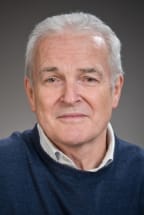For centuries people have sung about love, the joy of falling in love, the pain of heartbreak and that inevitable question: what is love?
Now a team of scientists have delved into psychology, evolutionary biology and neuroscience to try to answer that question.

Photo: 123RF
Their conclusion? It's rather practical: romantic love is an evolutionary adaptation – a commitment device to motivate us to couple up so that we can share responsibility for children.
"Pair-bonding helped advance the evolution of the high levels of social intelligence that characterise humans, including allowing for the massive investment required to rear children" - Professor Garth Fletcher

Professor Garth Fletcher. Photo: Supplied
The team, lead by Victoria University psychology professor, Garth Fletcher, has published the article 'Pair-Bonding, Romantic Love and Evolution: The Curious Case of Homo Sapiens', in the journal Perspectives on Psychological Science.
Professor Fletcher said falling in love was a potent mix of neurotransmitters at work, along with chemicals such as dopamine and oxytocin.
"Love is biological. The hormones were there before humans, you find a form of oxytocin, the bonding hormone, in snails from millions of years ago."
Professor Fletcher said pair-bonding may go back almost 2 million years. Evidence shows our ancestors, homoerectus, probably had pair-bonding, which allowed bands of them to survive.
So how has it made us more intelligent?
"Managing family relationships puts such big demands on cognition, so it started to accelerate intelligence and cooperation."
Some other species do pair-bond, including 80 percent of bird species. About 11% of primates pair-bond, but none of our closest relatives, the great apes, pair-bond, and human males are unique among primates in the extensive and lengthy provisioning and support given to their partners and children, both before and after weaning.
"Nothing compares to humans in terms of the role of the human father in providing long term support for the mother and child".

